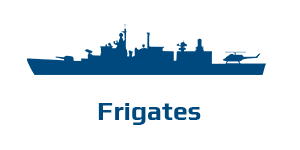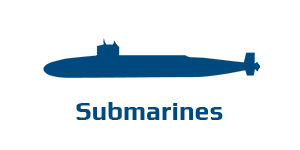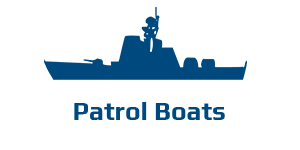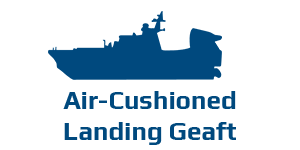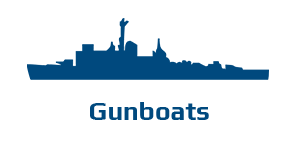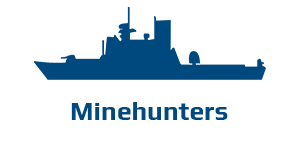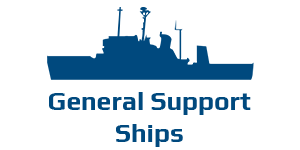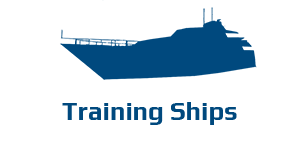Hellenic Naval War College
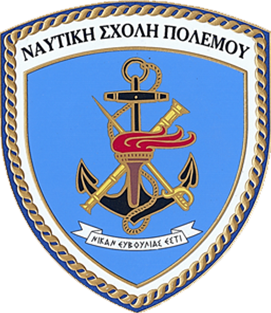
Crest
The Hellenic Naval War College (HNWC) crest features an Anchor, as a distinctive symbol of the Hellenic Nany and the sea, the Sword as a characteristic of power carried by the Officers, the Naval Telescope characterizing insight and focus on purpose, the Torch characteristic of imparted knowledge and the ideals that distinguish the Officer of the Η.N. Finally the banner of the crest bares the motto “NIKAN EVOULIAS ESTI” which means “Victory stems from effective decision making”.
History
GENERAL
Eleftherios Venizelos as Prime Minister in 1910 asked for Britain’s assistance in order to reorganize and modernize the Navy. In 1911, the British Naval Mission in Greece was formed, which proposed the establishment of a corresponding School in Greece as well.
HIGHER NAVAL WAR COLLEGE 1921 – 1929
In 1921, during the administration of D. Gounaris, the Higher Naval War College was established. Due to the Asia Minor campaign, the opening of the College finally took place in 1925.
Captain D. Oikonomou BN was appointed as the first Commander. British Commander A.G..Talbot RN, member of the British Naval Mission, was appointed as Director of Studies. The first educational course began in 1925 and ended in 1926. The College operated in the premises of the Old Palace (the current Parliament building). In 1926 the College was established in the premises of the Athens Observatory until 1940.
NAVAL WAR ACADEMY 1929 – 1931
In the year 1929 the School was by law renamed the Naval War Academy.
NAVAL WAR ACADEMY 1931 – 1947
In 1931, by a new law, the Naval War Academy was named the ‘’Naval War College ’’ (NWC). In 1940, the NWC ceased its operation due to the start of World War II. In 1945 it was decided to reopen the NWC.
NAVAL WAR ACADEMY 1947 – 1956
In the year 1947 the NWC was re-named the ‘’Naval War Academy’’. Captain M. Iatridis BN, acting Commanding Officer of H/S PAPANIKOLIS, was appointed as the first Commander of the Naval Academy. The British Commander J. Fallwell RN was appointed as the Director of Studies. The Naval War Academy was housed in the Naval Radio facilities in Botanic.
In 1955 the last British Director of Studies Commander DRG Goldsmith handed over duties to the first Greek Officer Director of Studies, Commander S. Mourikis BN.
NAVAL WAR ACADEMY 1956 – 2003
In 1956 by law, the Naval War Academy was renamed the Naval War College (NWC).
HELLENIC NAVAL COMMAND AND STAFF COLLEGE 2004 – 2019
The HNWC was closed in 2003 and merged with the army and air force war colleges to form the Supreme Joint War College located in Thessaloniki.
The modern Hellenic Naval Command and Staff College (HNCSC) was established in 2004 and based in the former HNWC facilities, since it remained within the HN command structure. It is therefore considered a successor of the HNWC. More than 3000 HN officers and 60 international students have graduated from HNWC or HNCSC. The HNCSC trains the future commanders and staff officers of the HN, other military services, Hellenic Coast Guard, and selected international students of equivalent seniority. The courses are designed to equip both Greek and international officers with the knowledge required for the full range of their future command and staff appointments.
NAVAL WAR ACADEMY 2019 – TODAY
In May 2019 according to law 4609/2019 the HNCSC was renamed to Hellenic Naval War College (HNWC).
Mission
According to the Organization of the College, the mission of the NWC is to provide administrative and staff training, postgraduate training in Naval Science and Strategy as well as information on new technological developments and scientific concepts related to the Armed Forces, with the aim of the appropriate training of HN officers for the performance of staff and administrative duties when assuming the prescribed administrative positions according to rank and specialty throughout the hierarchy.
The NWC operates as a scientific body of the Ministry of Defense, in matters of Naval Science and Strategy. It is possible for the NWC to be entrusted with the conduct of additional training schools following a relevant order of the HNGS.
COMMAND AND STAFF COURSES (CSC) CSC OF-2 AIMED AT LIEUTENANTS, HELLENIC NAVAL ACADEMY GRADUATES: GENERAL OBJECTIVES
The improvement of students’ ability in operational design, organization and control of naval operations, in the tactical formation, development and use of naval forces and means of support.
The promotion of students’ ability to study, research, evaluate, prepare and present integrated staff assignments, formulate proposals and make decisions in matters of Management and Control of Maritime Enterprises.
The promotion of students’ ability to plan, control, direct and execute naval operations through the design and conduct of war games.
Complementing the theoretical training with the execution of educational trips and visits, mainly to large formations of the Armed Forces.
Improving students’ knowledge of the principles and contemporary concepts of organization and management.
Informing them about the institutional framework, organization and procedures of civil-military alliances.
The fuller understanding of power relations in international environment.
Informing about national issues that affect the defense of the country.
Introduction to strategy and understanding of the importance and role of sea power and naval strategy.
The introduction to political issues of national defense and security.
Information on procedures for allocation of national resources to Armed Forces and the acquisition of defense material.
COMMAND AND STAFF COURSES (CSC) CSC OF-1 AIMED AT ENSIGNS, HELLENIC NAVAL PETTY OFFICERS ACADEMY GRADUATES: GENERAL OBJECTIVES
The promotion of students’ ability to research, collect data, evaluate, write and present comprehensive assignments.
The improvement of students’ ability to formulate suggestions and make decisions.
Information on National Defense policy issues, and on national issues and issues affecting the defense.
The full understanding of power relations.
Introduction to strategy and sea power.
Information on the institutional and organizational functioning.
Library
The Library building with a total area of 100 m2 is located to the east of the old building. It is the largest library of Hellenic Navy with 8,794 titles / 12,329 book volumes. The library has a significant number of books dating back to the 17th century, which are maintained in a private institution when required. Above book titles are listed on the respective websites of the NWC and HNGHQ website. It consists of the auxiliary spaces, such as the reception desk, the photocopier compartment and its main space with the book and publication archives. From 2021, the Library of HNWC is Member of ‘’Maritime Libraries Network – MarLiNet’’, a maritime thematic library network in Greece. It is consisting of 6 Special and 4 Academic libraries. The Network offers reference services on maritime and naval information and holds maritime orientated collections. NSP Library Contents Website: https://hellenicnavy.gr/dioikisi-naytikis-ekpaideysis-dne/naytiki-scholi-polemoy/vivliothiki-scholis/
Organization
SUBORDINATION
The NWC is subordinate to the Naval Education Administration (NDA). The Administrative Management is exercised by the HNGS, while the Commander of the Naval Training Command exercises its administrative control. Military control is exercised by an appropriate Law Service, as determined from time to time by a relevant General Order.
ORGANIZATION
1. The general administrative structure of the NWC has the following structure:
a. Commander.
b. Deputy Commander.
c. Directorate of Studies.
d. Directorate of Administration and Administrative Care.
2. The NSP staff is the administrative functional body through which the Governor exercises his duties. The administration of the staff is carried out by the Deputy Commander.
STAFF
1. The NWC is staffed by senior and junior military as well as civilian staff, which is divided into Administrative and Educational.
2. The Administrative staff, in accordance with the School Organization, consists of the Commander, Deputy Commander, Director of Studies, Director of Education and other military and civilian personnel.
3. The Educational staff consists of the Commander, Deputy Commander, Director of Studies, Heads of Studies and Education and Officer Supervisors.
4. The educational staff, according to the NWC Organization, also includes the Special Scientific Staff (SSS) and the Extraordinary Teaching Staff (ETC), but without being NWC staff. The SSS covers specific educational subjects in accordance with the NWC Organization and is hired with individual fixed-term employment contracts with hourly wages in accordance with current legislation. The ETC includes scientific associates, public figures and military instructors and is appointed on an hourly basis in accordance with applicable law.
Headquarters - Facilities
GENERAL
1. In the NWC, there are two Schools of compulsory training for Officers from Hellenic Naval Academy (and corresponding HIGHER EDUCATION INSTITUTE) and Hellenic Naval Petty Officers Academy respectively, with separate courses of study as follows:
a. The Command and Staff Courses (CSC) CSC OF-2, which is compulsory for Combat Officers, Engineers and Finance. HN Officers of other specialties, other branches of the Armed Forces, the Security Forces as well as foreign Officers as determined by the General Staff may also study at the NWC
b. The Command and Staff Courses (CSC) CSC OF-1 which Officers of the rank of Ensign must attend.
2. The main educational objectives of the CSC OF-2 and CSC OF-1 are detailed in the relevant School Organization, which is a Presidential Decree.
HEADQUARTERS
The headquarters of the NWC is located in the Votanikos Naval Fort, within the administrative boundaries of the Municipality of Athens, Attica.
FACILITIES
The NWC facilities are located within the Votanikos Naval Fort in Athens. The facilities include the following buildings:
a. The Old Building (Administrative Building – Amphitheater).
b. The New Building (Directorate of Studies – Classrooms).
c. The Library building.
d. The Wargame Building (JTLS).

